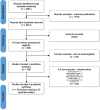Psychometric properties of leadership scales for health professionals: a systematic review
- PMID: 34454567
- PMCID: PMC8403357
- DOI: 10.1186/s13012-021-01141-z
Psychometric properties of leadership scales for health professionals: a systematic review
Abstract
Background: The important role of leaders in the translation of health research is acknowledged in the implementation science literature. However, the accurate measurement of leadership traits and behaviours in health professionals has not been directly addressed. This review aimed to identify whether scales which measure leadership traits and behaviours have been found to be reliable and valid for use with health professionals.
Methods: A systematic review was conducted. MEDLINE, EMBASE, PsycINFO, Cochrane, CINAHL, Scopus, ABI/INFORMIT and Business Source Ultimate were searched to identify publications which reported original research testing the reliability, validity or acceptability of a leadership-related scale with health professionals.
Results: Of 2814 records, a total of 39 studies met the inclusion criteria, from which 33 scales were identified as having undergone some form of psychometric testing with health professionals. The most commonly used was the Implementation Leadership Scale (n = 5) and the Multifactor Leadership Questionnaire (n = 3). Of the 33 scales, the majority of scales were validated in English speaking countries including the USA (n = 15) and Canada (n = 4), but also with some translations and use in Europe and Asia, predominantly with samples of nurses (n = 27) or allied health professionals (n = 10). Only two validation studies included physicians. Content validity and internal consistency were evident for most scales (n = 30 and 29, respectively). Only 20 of the 33 scales were found to satisfy the acceptable thresholds for good construct validity. Very limited testing occurred in relation to test-re-test reliability, responsiveness, acceptability, cross-cultural revalidation, convergent validity, discriminant validity and criterion validity.
Conclusions: Seven scales may be sufficiently sound to be used with professionals, primarily with nurses. There is an absence of validation of leadership scales with regard to physicians. Given that physicians, along with nurses and allied health professionals have a leadership role in driving the implementation of evidence-based healthcare, this constitutes a clear gap in the psychometric testing of leadership scales for use in healthcare implementation research and practice.
Trial registration: This review follows the Preferred Reporting Items for Systematic Reviews and Meta-Analyses (PRISMA) (see Additional File 1) (PLoS Medicine. 6:e1000097, 2009) and the associated protocol has been registered with the PROSPERO International Prospective Register of Systematic Reviews (Registration Number CRD42019121544 ).
Keywords: Change champions; Healthcare; Implementation; Leadership; Psychometrics.
© 2021. The Author(s).
Conflict of interest statement
The authors declare that they have no competing interests.
Figures
References
Publication types
MeSH terms
LinkOut - more resources
Full Text Sources
Miscellaneous



